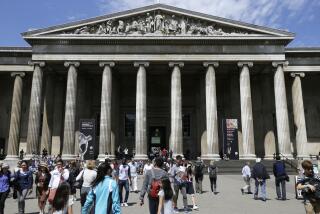Curator Left After Inquiry on Donations, Museum Says
- Share via
The J. Paul Getty Museum revealed Friday that Jiri Frel, its respected curator of antiquities, was relieved of his duties in 1984 and resigned in 1986 after it was established that he had accepted donations of works to the museum “in serious violation of the museum’s policies and rules.”
The tardy admission by the museum came after an investigative report Friday in the London Times headlined “Huge Tax Fraud Uncovered at Getty Museum.” The article, focusing on Frel, characterized the affair as “the biggest financial scandal in museum history.”
According to the London Times, Frel provided donors to the Getty with tax-deductible valuations of gifts sometimes exceeding 4 1/2 times their real value. This, the paper said, made it possible for a donor in the highest tax brackets to actually realize a profit on his donation.
Examples cited included a Roman bust sold at Christie’s for about $650 in 1978. A year later, it was donated to the Getty in Malibu after being valued by Frel at $45,000, the paper said.
Small Antique Pieces
Most commonly, according to the London Times, Frel matched donors with a supply of small antique ceramics, artifacts and figurines he arranged to be shipped to this country on consignment from European sources. He reportedly wanted those items to form a large study collection. The paper said the donors usually never saw the items they gave but received inflated tax valuations for them.
Some of the overvaluations were caught during spot-checks by the Internal Revenue Service, the paper reported. It said one item was a Greek vase valued at $100,000 only weeks after it had been sold at an auction for $35,000.
Getty officials refused to comment on the accuracy of the London Times report beyond their carefully worded statement.
In it, they said Frel was relieved after his associate curator, Arthur Houghton, “raised with the director designate of the museum (John Walsh) concerns regarding donation practices in the department.”
Relieved of Curator Duties
Walsh, according to the statement, then urged Houghton to get more information, which resulted in the museum’s bringing in “outside counsel” to conduct an investigation that uncovered violations of museum policies and rules regarding donations. Frel was relieved of all his curatorial duties and confined to research and writing until he resigned. Houghton also resigned in 1986.
According to the statement, there was “no evidence of personal financial gain” by Frel. Frel, who now lives in a Paris suburb, could not be reached for comment by The Times.
At the time of his departure, he said the reason for his decision to leave was poor health brought about by the weight of administrative duties and a desire to get back to the scholarly work that was his first love.
He joined the Getty Museum in 1973, building its antiquities collection from a few ancient scraps amassed by J. Paul Getty to a compendium that has been characterized as the third finest in the United States, coming only after those of the Boston Museum of Fine Arts and the Metropolitan Museum of Art in New York. His most famous acquisition was the so-called “Getty Bronze,” a rare 4th-Century BC Greek original by the legendary sculptor Lysippus.
In 1980, Frel was made a knight of the Order of Arts and Letters by the French government. Frel, Czech by origin, studied at the Sorbonne and other French schools.
More to Read
The biggest entertainment stories
Get our big stories about Hollywood, film, television, music, arts, culture and more right in your inbox as soon as they publish.
You may occasionally receive promotional content from the Los Angeles Times.










